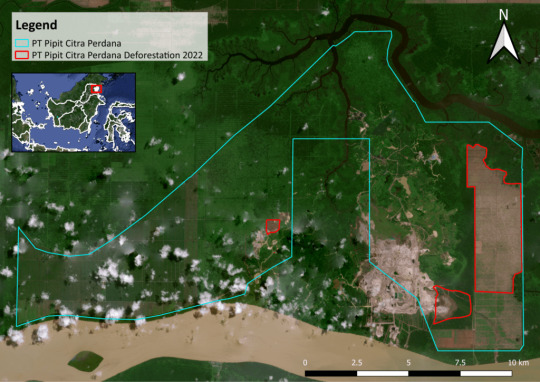#AidEnvironment
Text
Als hij kon toveren was niemand de sigaar
Als hij kon toveren was niemand de sigaar
Afgelopen Vrijdag publiceerde Duurzaam Nederland een welhaast neocoloniaal stukje over de ontbossing in Indonesië onder de kop ‘Tien palmolie-concessies in Indonesië hebben in 2022 al 8.100 hectare bos en veen gekapt‘. Daarin krijgt Marcel van Wing het hoogste woord, iemand zonder enige praktische kennis van natuurbeheer en oliepalmteelt in Indonesië. Marcel kraamt dan ook volslagen onzin uit,…

View On WordPress
#AidEnvironment#Duurzaam Nederland#Google Earth Pro#Indonesia#Indonesië#oil palm#oliepalm#Palm Oil#palmolie#The Flower Farm
0 notes
Text
Major brands like Zara and H&M sell garments produced with cotton from Brazilian farms. These have been linked to deforestation and land grabbing, according to a new investigation.
-Before they reach the display windows of fashion giants like Zara and H&M, cotton pants, shorts, shirts and socks leave behind a trail of deforestation, land grabbing and human rights violations in Brazil. Though many of them carry a sustainable production label, a yearlong investigation by UK-based NGO Earthsight detailed the connection between crops in Brazil, the world's fourth largest cotton producer, and European brands. Earthsight analyzed satellite images, shipping records, public archives and visited producing regions to track the journey taken by 816,000 tons of cotton.
According to the report, this raw material was produced specifically for eight Asian companies which, between 2014 and 2023, manufactured around 250 million retail items. Many of them, the investigation claims, supplied brands such as H&M and Zara, among others.
"It's shocking to see these links between very recognizable global brands that apparently don't make enough effort to have control over these supply chains. To know where the cotton comes from and what kind of impact it causes," Rubens Carvalho, head of deforestation research at Earthsight, told DW.
The problem lies at the source: Cotton for export is mainly produced in the western part of Brazil's Bahia state, a region immersed in a tropical and extremely biodiverse savanna called the Cerrado.
Vegetation in the Cerrado is often razed illegally to make space for crops and cultivation. Deforestation there has doubled in the last five years, according to Brazil's National Institute for Space Research.
Deforestation and land grabbing
Among the cases analyzed in the report is the SLC Agricola group, which claims to be responsible for 11% of Brazil's cotton exports. The Earthsight report estimates that in the last 12 years, Cerrado land equivalent to 40,000 football fields has been destroyed within SLC's farms.
And in 2020, the company, which also grows soybeans, was named the biggest deforester in the biome, according to the American think tank Chain Reaction Research.
In 2021, SLC committed to a zero-deforestation policy with its suppliers. A year later, a report by the nonprofit consultancy Aidenvironment found that 1,365 hectares of the Cerrado had been razed within properties that grow cotton. And almost half of this was within a legal reserve.
When questioned about these allegations, the group told DW that "all of SLC's conversions of native vegetation occurred within the limits established by law."
continue reading
#brazil#indonesia#bangladesh#pakistan#brazilian cotton exports#deforestation#european fast fashion#environment#climate crisis
3 notes
·
View notes
Text
An activist group and researchers tried to increase pressure on agribusiness giant Cargill on Wednesday to do more to fight deforestation and human rights abuse, releasing a report that accuses the company of not following through on commitments to help end such practices.
The report argues that the family-owned company has been misled by its managers and now should take the lead in ensuring it carries out its promises to fight forced child labor in the cocoa industry and protect forests and other natural resources. As one of the world's largest privately held companies and by far the largest grain distributor, Cargill is in a unique position to force positive changes, especially in ending deforestation, the groups said in the report.
"The destruction of the natural world is driven by agribusiness and agribusiness is driven by Cargill," said Todd Paglia, executive director of the environmental group Stand.Earth, at a news conference in Wayzata, Minnesota, a Minneapolis suburb where Cargill is based.
Besides the news conference, Stand.Earth highlighted the report by buying full page advertisements in The New York Times and Minneapolis Star Tribune newspapers. Later Wednesday, the group planned to deliver documents backing its report to the Wayzata headquarters of the families that own a majority of Cargill and ask that they be given to 20 leading members of the families.
Cargill did not immediately respond to a request to comment about the report.
According to its 2022 annual report, Cargill recorded $165 billion in revenue for the fiscal year ending May 31, 2022. The company says it has 155,000 employees and operates in 70 countries, with sales in 125 countries.
The report states that 193,000 square miles (499,868 square kilometers) of forest were destroyed through human activity from 2015 to 2020, primarily because of expansion of agriculture in South America, Central America and parts of Africa. Although Cargill has promised to end deforestation practices for products in its supply chain, the report argues the company has invested in ports and other infrastructure in South America that will lead to the removal of forests for land to grow soybeans.
The report, compiled with help from the Brazilian journalism organization Repórter Brasil and the nonprofit group AidEnvironment, also accuses Cargill of not following through on its commitments, first in 2001 and then in 2010, to end or at least reduce forced child labor in the cocoa industry. Cargill is one of the world's largest cocoa suppliers.
The report cited a U.S. Department of Labor-funded study that found the number of children harvesting cocoa in the Ivory Coast and Ghana and the prevalence of hazardous child labor in those countries had both increased.
“It's one thing not to meet an ambitious target,” said Mathew Jacobson, director of Stand.Earth. “It's another to have the problems you claim to be addressing get worse.”
Jacobson said he is hopeful the families that own most of Cargill will push for change if it realizes company executives are not making meaningful changes.
“We are not asking for anything the company has not already promised,” the report says in its conclusion. “We seek implementation, not new commitments.”
2 notes
·
View notes
Text
Brazil was Harvard’s preferred target. [...] Recent field investigations in Brazil show that the situation has not changed, and, if anything, it only seems to be getting worse. [...]
Harvard's Terracal subsidiary moved into their territory in 2010 [...]. Communications between Harvard and its Brazilian managers, made available through a labour court case [...], show that Harvard was aware of the conflict with local villagers [...]. The company has been ruthless in its tactics. [...] "We were watching wondering from one hour to the next when we would be killed", says one of the villagers. [...]

"We used to live off of fishing and farming. I can still remember the smell of rice when it was being harvested. But now we can no longer grow [...]". These are the words of a resident of Arthur Passos, a rural community in the north-eastern Brazilian state of Piaui, speaking in October 2019. Ten years ago, they gained official recognition as an Afro-descendent community (quilombola), with special protections under Brazilian law, and with this they began a process to secure official title over their territory. But in 2013 that process was dramatically interrupted.
A powerful company, owned by Harvard University's endowment fund, moved in and claimed all the area surrounding the villagers' homes. The company, Terracal – a subsidiary of another Harvard-owned company, Gordian Bioenergy – erected a 17 km fence and hired security guards to keep people out. The people of Arthur Passos could no longer hunt, fish, grow crops, [...] or collect fruits, medicinal plants and firewood from the forest as they had always done. [...] Terracal cleared forests from the land and was preparing to move ahead with a massive irrigated plantation project covering 45,000 hectares.

The Brazilian farmland deals have been especially disastrous for rural communities living in the areas where Harvard bought lands. [...]
The last [global “profound economic crisis”] a decade ago, which was caused by a collapse of the financial sector, triggered a global rush for farmland, as pension funds, private equity boutiques and billionaires sought refuge from tanking stock markets by speculating in so-called natural resource assets. Big players like the US pension fund manager TIAA and Sweden's national pension plan shifted hundreds of millions of dollars into new farmland funds.
But of the many financial houses suddenly looking for farmland, none was more aggressive than Harvard University's US$40 billion endowment fund. In an eight year period following the 2008 crisis, Harvard poured over US$1 billion into amassing a global portfolio of farmlands, covering nearly 1 million hectares [...].

Brazil was Harvard’s preferred target. It established three offshore structures, operating through three different Brazilian agribusiness operators, to buy Brazilian farmland. By 2016, these three structures had amassed over 40 rural properties covering approximately 405,000 hectares, an area twice the size of all the farmland in the US state of Massachusetts.
In September 2018, Rede Social de Justiça e Direitos Humanos and GRAIN released a report documenting the human rights violations happening on some of Harvard-owned farms in Brazil and the University's lack of due diligence [...]. Our recent field investigations in Brazil show that the situation has not changed, and, if anything, it only seems to be getting worse. Moreover, new information shows that Harvard purchased more farmland in Brazil than previously estimated, and that its operations are connected to alarming levels of deforestation and forest fires in the Brazilian Cerrado (the most biodiverse savannah in the world) [...].

Much of the deforestation that takes place in the Cerrado is the result of fires that are deliberately set by agribusinesses to expand their holdings. [...] Research conducted by AidEnvironment found that Harvard's farms overlap with the areas of the Cerrado where there was a heavy concentration of forest fires in 2019. [...] This was later confirmed by field visits to the communities undertaken by Rede Social de Justiça e Direitos Humanos in October 2019. The villagers of Arthur Passos believe that the fires were set deliberately, as a way to keep them from entering the area. [...]
"The forest reserve of [Insolo's] Galileia farm is all burnt. The reserve they left, in the lowlands, everything was burned", said one Baixao Fechado resident, speaking about the section of the former Harvard farm property that the company was legally obliged to protect as a reserve and not clear for farming.

The Baixao do Aleixo community in the neighbouring north-eastern state of Bahia is in a similar situation. Harvard's Terracal subsidiary moved into their territory in 2010, when it bought a contested title to a large parcel of land from a wealthy Brazilian family. Since then, there's been a tense conflict between Terracal and the villagers who have used the land [...] for generations. [...]
Communications between Harvard and its Brazilian managers, made available through a labour court case filed by a former Terracal employee, show that Harvard was aware of the conflict with local villagers at its Bahia property.[...]
The company has been ruthless in its tactics. Villagers say people hired by the company offered them bribes, deliberately set neighbours against each other, and threatened and intimidated people with violence. "We were watching wondering from one hour to the next when we would be killed", says one of the villagers. [...]
------
Headline, photos, map, captions, text excerpts: GRAIN and Rede Social de Justica e Direitos Humanos. “Harvard’s land grabs in Brazil are a disaster for communities and a warning to speculators.” 8 May 2020.
468 notes
·
View notes
Text
l’Europe veut bannir les produits liés à la déforestation
l’Europe veut bannir les produits liés à la déforestation
2021-11-17 17:32:55 https://reporterre.net//
Une zone déforestée pour produire de l’huile de palme, en Indonésie. – Wikimedia / CC BY-SA 2.0 / Aidenvironment
Une zone déforestée pour produire de l’huile de palme, en Indonésie. – Wikimedia / CC BY-SA 2.0 / Aidenvironment
Soja, bœuf, huile de palme, bois, cacao, café… Produire ces denrées, très consommées en Europe et gourmandes en surfaces…

View On WordPress
0 notes
Text
The Shy Activist- Palm Oil Palm Oil Palm Oil
Palm is the most commonly used vegetable oil, it is in most food products and mixed with motor vehicle products. I have found that it’s really difficult to find any food products that don’t have palm oil in them. As an ethical eater I try to avoid food that uses palm oil because of the impact it has on the environment and animals.


Air Pollution
Palm Oil is cultivated in tropical places such as Southeast Asia, Latin America and Africa. Vast areas of forest are destroyed to make room for more palm oil plantations everyday.
When forests are bulldozed and torched large amounts of harmful gasses are released into the atmosphere.
The fires also affect the health of workers and people who live in the surrounding areas.
Animals
Tigers, elephants, rhinos and orangutans are threatened by Palm Oil production. Endangered species habitat’s are destroyed for the purpose of Palm Oil and they “are squeezed into increasingly isolated fragments of natural habitat.”
Pail Oil forests have the least amount of biodiversity at 11 species compared with 80 species in a primary forest.
All animals are affected when poison is used to eliminate rats.
Communities
Deforestation for the purpose of Palm Oil displaces communities who aren’t recognised by the government when the land is handed over to companies. People are pushed out of their land which often creates friction within communities and against companies.
Farmers who are pushed out of their land then have to clear forests to set up a new farm. New farm land is often very far from towns which restricts access to markets and health and well being services.
Labour rights- taken from SPOTT
Workers often live in poor conditions without access to basic facilities such as clean water and lighting, and are isolated by a lack of social support and cultural barriers.
Some oil palm plantations are dependent on imported labour or undocumented immigrants.
Trafficking cases have been identified in Malaysian and Indonesian oil palm plantations. Workers often have their passports and other official documents confiscated and are not given proper contracts. They can face abusive conditions and can be threatened with deportation or confiscation of wages.
Child labour is a common problem in Malaysian and Indonesian oil palm plantations. Children receive little or no pay and may be forced to endure harsh working conditions including long hours and exposure to toxic chemicals. This can be driven by poor education, a lack of school facilities and a generally low regard for education in rural areas.
In Malaysia, it is estimated that between 72,000 and 200,000 stateless children work on palm oil plantations.
“Reports of displaced communities and illegal land grabs are not uncommon. The resulting conflicts, loss of income and dependence on large plantations have had a significant impact of the social welfare of many.”
Can things improve?
Greenpeace supporters campaigned for many years and put pressure on big brands to stop using Palm Oil company until it changed it’s practices. IOI, the worlds third largest Palm Oil company, has now put together an action plan agreed to independent third-party verification of its progress in one year’s time. This came after a suspension from “Roundtable on Sustainable Palm Oil (RSPO) following a complaint by environmental organisation Aidenvironment, which meant it could no longer call any of its palm oil 'sustainable'”
Unilever and Nestle have stopped buying from IOI and refuse to buy from IOI after the suspension from RSPO has been lifted.
“One of the most important points is that IOI will be actively monitoring its suppliers to ensure they too are safeguarding forests and people. Any company selling palm oil to IOI will need to prove it is protecting forests, so the impacts should spread far beyond IOI's own operations.”
Here is a list of things you can do taken from rainforest rescue:
Enjoy a home-cooked meal using fresh ingredients and oils such as sunflower, olive, rapeseed or flaxseed are ideal for cooking and baking.
Read labels: As of December 2014, labeling regulations in the EU require food products to clearly indicate that they contain palm oil. However, in the case of non-food items such as cosmetics and cleaning products, a wide range of chemical names may still be used to hide the use of palm oil. A quick check of your favorite search engine will turn up palm oil-free alternatives, however.
Ask your retailers for palm oil-free products. Write product manufacturers and ask them why they aren’t using domestic oils.
Sign petitions and write your elected representatives: Online campaigns put pressure on policymakers responsible for biofuels and palm oil imports. Have you already signed all of Rainforest Rescue’s petitions?
Leave your car at home: Whenever you can, walk, ride a bicycle or use public transport.
Ethical Consumer have put together a list of products that contain no palm oil or sustainably produced palm oil. I’m going to focus on the chocolate list because that’s my vice!!! But have a look at the rest of the list for more products.
Other Palm oil-free boxes of chocolates:
Vivani (organic): all gift chocolate (mini bars gift tins)
Co-op: 24 Assorted Chocolate Truffles, Chocolate Coins, Truly Irresistible Milk Chocolate Truffles gift cube, Truly Irresistible Mint Selection, Loved By Us Belgian Chocolate Pralines, Loved By Us Irish Cream Liqueurs
Mondelez: Terry's Chocolate Orange Plain, Toblerone (all varieties)
Guylian: Seashells, Dark Chocolate Sea Horses, Pearles d'Ocean tin
Lindt: HELLO Milk chocolate heart tin
Best company rating for palm oil:
Booja Booja (organic, palm oil free company),
Divine (Fairtrade, palm oil free company),
Cocoa Loco (organic),
Montezuma (organic),
Vivani (organic),
Ferrero Rocher, Raffaello,
Mondelez brands (Green & Black's Organic Collection, Milk Tray, Roses, Heroes, Terry's Chocolate Orange, Terry's All Gold, Toblerone),
Mars brands (Celebrations),
Guylian,
Lindt: Lindor, Lindt
Co-op
Worst company rating for palm oil:
Thorntons,
Elizabeth Shaw,
ASDA,
Morrisons,
Tesco,
Aldi,
Lidl,
Iceland
FAIR FAVOURITES- Ethical Collection
OK these guys have such a beautiful collection. I want everything!
“Giovanna Eastwood founded Ethical Collection in 2015, encouraged by the work of her mother's charity in Brazil. The charity taught young women to craft and sell bags made of recycled material and Giovanna witnessed the impact that the work had on these women and their communities. The pride they took in their art and the environmental benefits of recycled material gave her inspiration and incentive to dedicate her skills to ethical fashion.”
Pitusa Pom pom Top Pink

Uzma Bozai Cotton Sagittarius Sweatshirt Grey

Armor Lux Organic Cotton Red Breton Top

Beaumont Organic Sophia Maxi Dress Navy & Red

Sources and further reading
https://www.rainforest-rescue.org/topics/palm-oil#start
http://wwf.panda.org/what_we_do/footprint/agriculture/palm_oil/environmental_impacts/soil_water_pollution/
http://www.greenpeace.org.uk/blog/forests/major-palm-oil-company-promises-protect-forests-20170428
http://greenpalm.org/about-palm-oil/social-and-environmental-impact-of-palm-oil
http://www.sustainablepalmoil.org/impacts/social/
#rainforest#forest#palm oil#vegetable oil#deforestation#animal welfare#endangered species#tiger#orangutan rhino#tigers#endangered animals#pollution#greenhouse gases#fashion#ethical fashion#food#hide#shy#shy activist
1 note
·
View note
Text
From Certifying Operations to Transforming Systems
These ‘systemic impacts’ help to create an enabling environment for production and consumption practices that benefit people and the planet, and contribute toward the Sustainable Development Goals. They include both tangible impacts, such as the creation of public and private policies or new partnerships, and intangible impacts, such as building trust and influencing socio-cultural attitudes.
WWF and ISEAL commissioned sustainability consultancy Aidenvironment to explore this largely uncharted territory.
Jan Willem Molenaar from Aidenvironment, said: “Although systemic impacts can be difficult to capture, we found numerous examples of changes large and small that standards have helped to bring about. Increased understanding of these systemic impacts can help standards and their stakeholders become more effective in improving the enabling environment for sustainable production.”
The white paper, which explores the concept of systemic impacts, shares case studies of a number of potential impacts including:
Stakeholder collaboration: Standards can help facilitate dialogue between multiple stakeholders, strengthening coordination, strategies and partnerships to tackle key sustainability issues. In some cases, such dialogue has led to the development of new industry initiatives and jurisdictional approaches. For example, in Sabah, Malaysia the state government, industry and civil society are working together to certify all oil palm operations to the Roundtable on Sustainable Palm Oil (RSPO) standard by 2025.
Knowledge and investments: Standards can help expand the knowledge base and develop tools to support sustainable production, pioneering concepts such as the high conservation value (HCV) approach and paying living wages. There are also cases where some standards have funnelled investment into training and capacity building that improves practices among large numbers of producers, not only those seeking certification.
Policies and behaviour: By engaging with businesses, government and the finance sector, standards are in a strong position to work with partners to influence policies, corporate behaviour and public opinion. The paper notes many cases where standards have directly influenced government policy and regulations in several countries and sectors – from aquaculture in Vietnam and coffee in Brazil to cotton in Mozambique and forestry in Peru.
Andrea Dreifke-Pieper, Director Markets & Finance, WWF Germany, said: “To bend the curve of biodiversity loss, we urgently need to shift to new sustainable production and consumption systems. This latest research demonstrates that voluntary sustainability standards have a valuable role to play – not just through positive conservation impacts at a local level, but by tackling the underlying causes of unsustainable practices and advancing better alternatives.”
Karin Kreider, Executive Director of ISEAL, said: “It’s clear that ISEAL member standards are delivering positive impacts well beyond individual value chains and certified operations. We believe there’s great potential in strategically targeting these systemic impacts. We look forward to building on this initial success to achieve even greater and longer-lasting benefits for people and the environment.”
For WWF, ISEAL, its members and other stakeholders, putting more strategic emphasis on targeting and monitoring these systemic impacts is an opportunity to achieve broad and long-lasting benefits for people and nature.
- Read the full report
- Register for the webinar ‘From certifying operations to transforming systems’, 3 December, where WWF, ISEAL and Aidenvironment present the findings and examples of systemic impacts.
source: http://www.csrwire.com/press_releases/41561-From-Certifying-Operations-to-Transforming-Systems?tracking_source=rss
0 notes
Text
Palm oil firms using ‘shadow companies’ to hide their links to deforestation: report
http://bit.ly/2m2P3iK
Major agribusiness firms are using opaque corporate structures to gain access to palm oil sourced from plantations operating in violation of their sustainability commitments, according to an investigation into the practice by a leading research group. The report, by risk analysis group Chain Reaction Research (CRR), alleges that large conglomerates in Southeast Asia’s plantation sector often deliberately hide the true ownership of controversial assets without relinquishing control. As a result, deforestation takes place at plantations that belong to the same ultimate owners as firms that subscribe to No Deforestation, No Peat, No Exploitation (NDPE) sourcing policies. These firms have promised to refrain from clearing forest and peatland, grabbing land from rural communities, and abusing their laborers. Under pressure from civil society groups, large corporations up and down the palm oil supply chain began to issue NDPE policies five years ago. But to avoid losing control of assets found to be in breach of these policies, palm oil firms established side businesses controlled by family members and sold off assets to related parties in a bid to cover their tracks, the report alleges. “The biggest issue for us is to stop deforestation. We are particularly concerned about this ‘shadow company’ issue as it really threatens NDPE policies, by allowing growers to continue to deforest, and allowing them to still find a market with companies with NDPE policies,” Chris Wiggs, a consultant with Aidenvironment, a partner organization of CRR, told Mongabay. The biggest palm oil traders, he said, “have so far appeared…
0 notes
Text
LSM Asing Penyerang Industri Sawit Nasional Harus Dilawan
LSM Asing Penyerang Industri Sawit Nasional Harus Dilawan
Harianpublik.com, JAKARTA – Anggota Komisi IV DPR Firman Subagyo mengatakan, lembaga swadaya (LSM) asing yang sering menyerang industri sawit nasional perlu dilawan.
Untuk itu, pemerintah diharapkan lebih serius membela industri sawit yang terbukti berkontribusi signifikan terhadap perekonomian nasional.
“Saya kira, kampanye hitam dari LSM asing ada motif bisnis. Ya, harus dilawan,” ujarnya dalam keterangan tertulis yang diterima JPNN, Sabtu (23/6).
Dari beberapa LSM asing, Mighty Earth (AS) dan AidEnvironment (Belanda) diduga rajin menebar informasi miring soal industri kelapa sawit di Indonesia.
“Ke depan, DPR ingin sektor ini dilindungi. Makanya kami dorong lahirnya UU Perkelapa sawitan yang saat ini sedang dibahas di DPR,” papar Firman.
Menurut Firman, industri sawit memiliki potensi ekonomi yang mumpuni.
Dari ekspor sawit, terkumpul devisa sebesar USD 20 miliar per tahun.
“Sawit menjadi salah satu potensi pengurangan pengangguran. Kelapa sawit juga dapat menjadi jawaban untuk keseimbangan antara Pulau Jawa dengan luar Jawa”, kata Firman. (Jpnn)
Sumber : Source link
0 notes
Text
Sejumlah Manajer Aset Negara Nordik Ini Punya Andil terhadap Perusahaan Sawit RI
Kantor konsultan Belanda, Aidenvironment, merilis laporan menyangkut peran perusahaan manajer aset dari negara-negara Nordik terhadap perusahaan sawit di Indonesia. http://dlvr.it/PHvMy9
0 notes
Text
Mankind has destroyed a tenth of earth's wilderness in 25 years - Outdoor Revival
Mankind has destroyed a tenth of earth’s wilderness in 25 years – Outdoor Revival
Aidenvironment, CC BY-SA 2.0 More details The last batch of sawnwood from the peat forest in Indragiri Hulu, Sumatra, Indonesia. Deforestation for oil palm plantation.
All one has to do to see the alarming rate of deforestation of the last remaining wilderness areas left in the world is take a good look at Google Maps. “But” you say, ”that’s on another continent, it doesn’t affect me.” The…
View On WordPress
0 notes
Text
Sejumlah Manajer Aset Negara Nordik Ini Punya Andil terhadap Perusahaan Sawit RI
Kantor konsultan Belanda, Aidenvironment, merilis laporan menyangkut peran perusahaan manajer aset dari negara-negara Nordik terhadap perusahaan sawit di Indonesia. http://dlvr.it/PHvMjx
0 notes